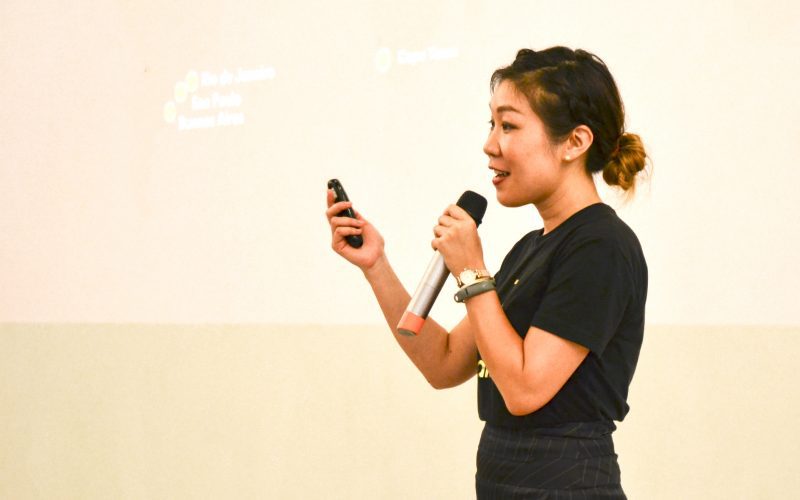哈囉!各位 CAREhER 的讀者大家好,我是今天的主持人 Tiffany,又到了語音專訪的時間。大家去旅行的時候,會訂飯店,還是做另一種選擇呢?Airbnb 在這幾年真的顛覆了旅行業的市場,它讓許多的旅人有了另一個選擇,可以借住在比較有個性、設計感、有故事的家,今天在現場的就是 Airbnb 的東南亞、台灣、香港的 Country Manager, Robin.
Robin 要跟我們聊聊她在 Airbnb 的工作、她怎麼去看待新世代人才,以及身為專業職場女性,她如何建立自己的 support net,我們來歡迎 Robin!
Tiffany: Hello Robin.
Robin: Hello Tiffany, thank you so much for having me here.
編按:以下為英文逐字稿,有興趣的讀者可參考中文逐字稿。
Robin, It’s great to have you, can you tell us about your job first? What exactly does a country manager at Airbnb do?
So a country manager at Airbnb oversees the business in each of the markets. A country manager will look at the market health, manage the balance between the supply and demand, supply being the homes that you put on the platform, and demand being the guests that are booking the homes. On top of that, the country manager will manage some of the issues, challenges and opportunities for each market. It’s really depending on the maturity of the market, so every country and city is at the different stage of growth.
What stage do you think Taiwan is right now?
To me Taiwan is still a very emerging and huge opportunity market for us, in fact it’s one of our top growth market, so for Airbnb, it’s extremely important to us, it’s one of the gateways for Asia and those that we’re certainly at the early stage with.
Before Airbnb, you had a career path that is more about marketing and strategic planning, and you’ve majored in electrical engineering. So what did you do before Airbnb, and can you explain why you did this jump?
Yeah I had a very diverse work experience and educational background, I studied electrical engineering at Purdue university many years ago. I started up as a engineer at a Semiconductors solar company.
I really love being in the work that details of things like how machines work, how systems can be integrated and the types of products that can be produced from systems. But I discovered that I also really like interface with customers and managing the relationships that are looking at things from the a business perspective as well. So I ended up going to business development, business management. And at that point, I realized I wanted to try new things, and I got my MBA from Columbia University and joint program with Berkeley, and I was able to now have a very diverse background.
I’ve worked across multiple companies, industries such as Fin-tech as well as Semiconductors and solar and consulting for media and technology companies. and now I’m at Airbnb with hospitality.
So you asked about some strategic planning roles, I think growing up I’m always that person who’s really interested in nuts and balls, and understanding the different steps for building whether be a product, platform or experience. Whenever I host my friends, I’m always the one who plans things, I think of ways to make the experience even more amazing. And I think because of that passion for planning and that foresight into how to make things really good, I got into strategic planning for different companies.
Back to strategic planning, I have quick question, is this something you can build your skills upon? or is it something that you really have to gain experiences in order to prove that you are capable in that role?
It’s certainly something that you can gain skills in. I always say that strategic planning is something where you can start up with the passion for it, which really helps, but if you practice you can get so good at it.
And It’s really all about managing the priorities, time and activities, and then stand on top of things. So one of the things that I think really helps with strategic planning is to stay intellectually curious, always learning. So I try to stand on top of things by reading articles and books as well as looking at what other market players are doing, and by doing that I can then learn more about trends in the industry, understanding the trends will help you be more strategic and have foresight into how to grow a business.
So that’s how you continuously push yourself and learn to grow professionally.
Oh certainly, It’s certainly all about learning, and I find different sources of information and learning all the time, whether be online, watching videos on youtube and reading articles or meeting with friends and colleagues just to have a good coffee chat over different topics.
I wanna jump quickly to what you said about meeting friends and colleagues, for female, I don’t know if it’s because we are more shy or introvert, we don’t really know how to build our professional network, very different from guys, they can probably talk about deals and business together when they go golfing together. So how do you develop that part as a female?
Yeah I think it’s extremely important to develop that, I think a network is incredibly important to each person, it doesn’t matter what type of role you have or what company you work for, I think it’s important have a network because I think it’s important to have a strong community of support, and one of my friends once describe this as it’s important to have your own board of directors, so just as a company has a board of directors that can be a sounding board, support system and be like your checks and balances all throughout this lifecycle of a company. I think it’s important to also have your board of directors for yourself.
On my board of directors for instance, I have my sister who’s really a close friend, close person to me, I also have a colleague whom I really trust. And I think that’s the first step is building that community of support, you don’t always have to find a common activity or sport in order to engage with someone, or expertise, but if you share your own expertise or thoughts with someone, you will see that their action will be pretty receiving of it and reciprocating that with you.
So I think that exchanging the information is something that you need to put yourself out there for, and then you can build a community of support.
Community of support is very similar to having mentors, do you have your own mentor and have you ever mentored people before?
Yes so mentors can be in your community of support, and a mentor by definition is someone who can be your coach or someone who helps, listens to your challenges, helps you reach full potential and guides you for that.
As for mentors, do they have to be someone that’s more senior at work?
Not at all, I don’t think mentorship has any sort of correlation with age, I do think that mentorship can vary in a positive way with experience. For me, I have quite a few mentors, I don’t just have one, and the reason is because I like learning from different people, different people have different perspectives, and hearing those perspectives will only make me stronger, so for instance I do have a few mentors right now at my company, at Airbnb, these are colleagues whom I really respect and trust and who work adjacent to me in my current role. and I will just reach out to them and say “Do you wanna have coffee or have a drink? Just have one on one to talk about different opportunities.”
On the same note what we often find is that the mentor who mentors me will sometimes learn from me by my responses, so I think this mutual mentorship is something that definitely happening a lot more these days, because people are reciprocating and they are wanting to help each other. I also mentor a lot of people, and I spend hours each week just coaching employees and those some of my favorite meetings to have. I get feedback and they get feedback from me as well, it’s just extremely invigorating.
Going back to mentorship, it’s not just finding a mentor, it’s also really important to maintain the relationship, cause a lot of them are very busy. So how do you maintain the relationship with your mentors?
I think it’s really important to figure out what their interaction style is, what their preference is, so it’s different for every person.
My style, I’m actually pretty good about stay on top of my emails and messages, I’m on my phone a lot, I’m pretty whimsical and spontaneous, so if you’d reach out to me “Hey do you wanna grab coffee in few hours?” If I’m in town, and I’m free, I’d be going to do that.
That’s so nice of you.
Whereas some other people may need weeks or months planning, so I think you have to really understand your mentors’ interaction style and preference. For me, I had one mentor who’s really busy, travels a lot, has three children and is an executive of a company, I try to be very respectful of her time and I also set up the meetings in advance. In additional to being respectful of her time is also to kind of give her heads up so she could prepare for our meeting, in case she wants to do some research or think about how she might wanna speak to me.
but I have another mentor who’s also very spontaneous and free spirited, we catch up while spend the time.
Can you share with all the other professional female out there who are ambitious and want to elevate in their career, what’s the one piece of advice that you would give them?
Oh gosh I feel like there are tons of pieces of advices that we should be looking at, because the great thing is that really sky is your limit, I mean definitely keep learning. I think something that I mentioned earlier like keep reading, checking out videos online and learning from others. I also think that people need to reflect, and reflect often, so one of the things that we will do is do self-check.
How do you do self-check?
For me, people always joke around that I am kind of my own therapist evaluate myself. I do challenge myself on “If I am making a right decision?” “How do I feel today?” “Am I excited to get out of my bed to go to this job?” “Am I excited to attend this meeting?” I also speak to people who give me feedback all the time, so I think constructive feedback is incredibly important. I also try, just try to put myself out there. I try and I fail. When I fail, I learn it really fast, and I won’t repeat same mistakes. So I think that reflecting often is something that we should all practice doing more.
Can you give us an example of how you found your specific mentor and how do you actually have that person to answer your questions and challenges?
I think that you can pretty much approach anyone in this world to be your mentor, and it doesn’t have to be an official role of mentorship, it can even be a casual role while you don’t even tell the person that that person is a mentor. I mean, really, learning happens everywhere, so recently, I reach out to this someone who’s a pretty high level leader at Airbnb, and I asked for one on one. I provided the context for the background of my experience, my interests and I also explained what kind of insights of experiences that I wanna share with her.
I think that providing that type of information then made it really easy for her to turn around in 10 minutes and set up a one on one with me, so I think one thing is approach anyone that you want to, because you are interested in that person’s career, interests or leadership style. But make sure that you provide the context so that they can connect the dots, once they connect the dots, it’ll make it really easy for them to receive it. But as I mentioned earlier, you also don’t have to make it too official, you can simply reach out to someone and say “Hey! Do you want to just chat about XYZ?” and during that chat, you know, could be an informal way of learning.
Right, by preparing context you really don’t wanna waste other people’s time, and that really helps you to respect other people.
Cause certainly, I feel like very often, I receive imbalance on mentorship. One of the challenges for me is when people don’t provide any context at all, it’s hard for me to link back to how I can help them, if I am the right person to help them, perhaps I know someone who can be even stronger of mentor for this person, so I think that if we can provide more detailed context and be authentic about it.
Are you someone that would strictly compartmentalize your work and leisure, such as a work-life balance person? Or are you someone that is more of a work-life integration person?
I think that’s a great phrase and I think it’s really interesting to hear about work-life integration. I am probably by that definition, more of a work-life integration person, but I will say that work-life balance really is depending on the person’s definition of what it is. So I mean everyone needs to figure out what is work-life balance to me, and what’s gonna make me happy, for instance, for myself. I don’t have any kids right now, but one thing that I do want to spend my time on outside of work is for instance like staying healthy. It’s really important for me to work out a few times a week, being able to get away and go to my yoga class or to my gym, and that makes me happy. It’s nonnegotiable for me, I need to have them every week.
I also have friends who have children, who need to able to leave from work whenever they can, to pick them up on school, and that is a priority for them. So based on my own definition, I feel like I do have work-life balance, I also don’t feel that I need to abide to certain hours to work. When I get home, if I have an email that comes through that I need to get to, I have no problem opening my laptop and writing an email, but the same time, when I am at the office, if I feel like I want taking a walk around the office, or just to leave to get a coffee, I also have no problem doing that.
I think it’s also because Airbnb is a newer company that respects employees, their own working style, so you get to choose when you want to, what your own style like the time you can work or how you perform better.
Airbnb has an amazing culture where it’s really flexible, entrepreneurial and open minded, so really allows employees to come in and feel like they can belong anywhere. We have employees that need to work from a certain desk, you know, from 9 to 5 each day, there are other employees who like to have more flexible schedule, they want to move around in the office or work from outside of the office, so I do think that Airbnb’s culture allows for us to work in this way.
Do you manage a lot of millennials?
I work a lot with millennials. How to say that? In our office, we have quite a few millennials, and to me, an interesting thing is millennials isn’t more of an age or age bracket, I think it’s more of a mindset. Some millennials are very creative, innovative, fast-moving, ambitious, they also want like immediacy, they want to know how they can contribute to a company or your mission, they want ownership, and they want to learn from a variety of leaders and people across like a holistic business, so it’s really interesting group of individuals, and I do work a lot with them and so just by like knowing that they like and want all these things, and it also challenges me to be a better colleague and leader, so that I can work with them.
On that note, I do also challenge millennials to be receiving of other employees and challenge themselves in how they interact with us.
You’ve also co-founded a women professional development network in the valley, have you done any of that at Airbnb?
Yes, I think I’ve been doing these types of organizations for past 15, 20 years. So at a company I started the women professional development network in silicon valley, and then I’ve been jumped to another company where I also liked one of the woman organizations there. At Airbnb, I’ve started an organization called “Glow” which stands for “grow, lead, own-it and wild”, and it’s conjunctional with our women at group, which is about women’s leadership and development. So to me, I mentioned earlier about building a community of support, I think you should start one wherever you go. Bring people together, plant seeds, get them growing together, break down the barriers so people can help each other, and when women help each other out, such amazing things can happened. Beyond the title of an organization, it just all about building a community there. At Airbnb, I’ve started to build a community where even men want to join.
So you brought men in?
Oh yes, because men have sisters, girlfriends, moms, daughters, they are huge advocates of diversity of women’s development, so we bring these people together and address these hard topics, I think we can do a lot of things similar to things like CAREhER is trying to tackle, so I am very excited about this organization that you have, too.
A lot of our readers are also millennials, do you have one piece advice to give, as a manager, to these millennial talents?
I think that for millennials, there is a difference between running away from something or running to something. Often times I’ve met millennials who would run away from something when they are fed up, frustrated or bored. It’s important to be thoughtful about your career, not because you need to be successful in a certain way, it’s because you will feel more fulfilled if you are thoughtful about it and you know where you wanna move next, whether be in the company, outside the company, not at a company at all, and if we can be more thoughtful, you will feel more passionate about your own career, and what you are doing in your life. So I think that’s one piece of advices, just to be very thoughtful, reflect often and just keep learning.
Thank you!
Cover photo via Plan b
歡迎加入 CAREhER 粉絲專頁,收到最新各領域跨國工作者專訪,一起提升你的職場競爭力
Our Podcasts
Dialogues to lead discussions that matter to today’s women: Career, wellness, relationships, innovation and latest trends. 20 mins per episode of original authentic content.
每集20分鐘的「她與她」音頻,我們討論職涯規劃、人生關係、身心靈的健康和平衡、科技、新創以及新世代工作女性在乎的議題。








